广东省深圳市Module 4 Unit 7 Memory Grammar 课件
文档属性
| 名称 | 广东省深圳市Module 4 Unit 7 Memory Grammar 课件 |

|
|
| 格式 | zip | ||
| 文件大小 | 173.1KB | ||
| 资源类型 | 教案 | ||
| 版本资源 | 牛津深圳版 | ||
| 科目 | 英语 | ||
| 更新时间 | 2016-12-13 00:00:00 | ||
图片预览

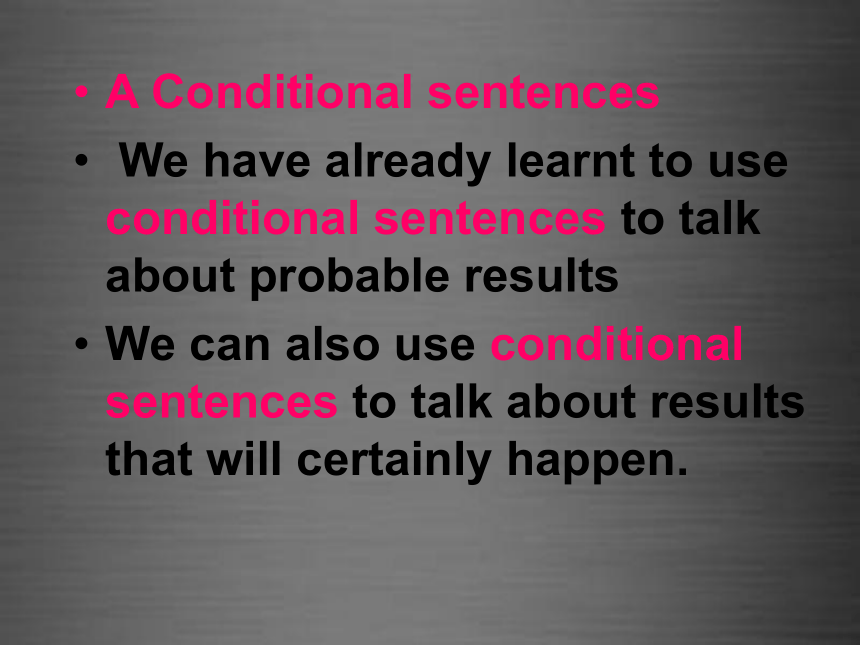
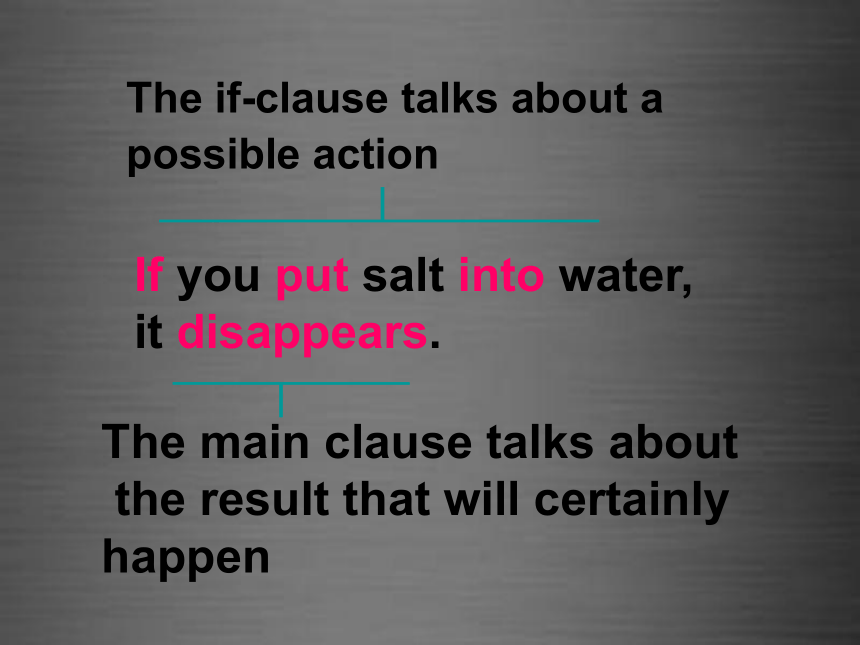
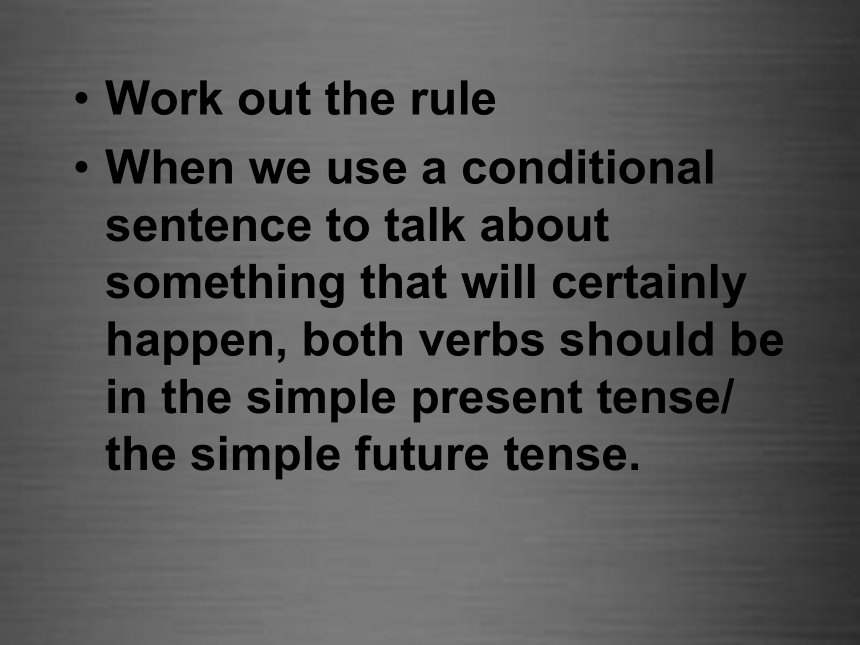
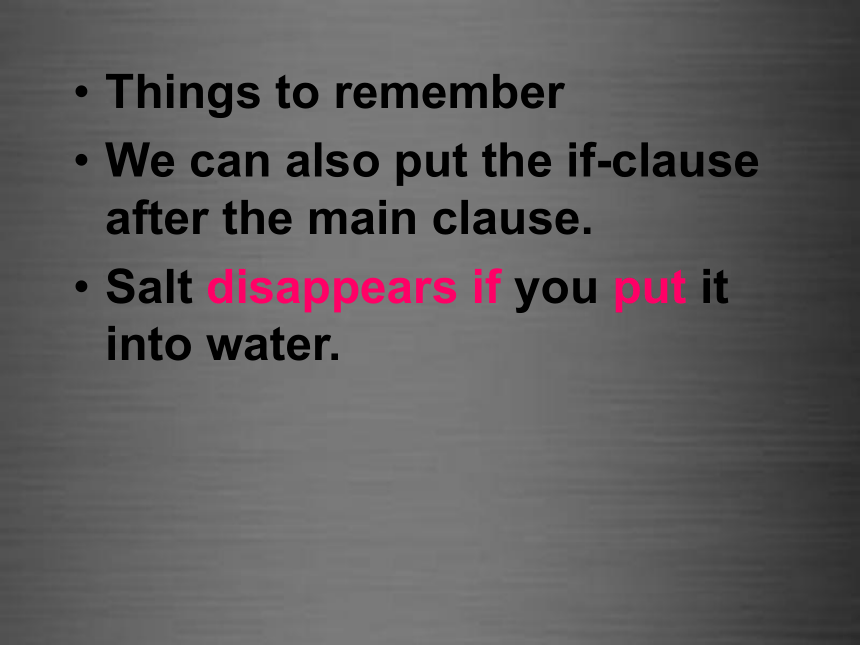

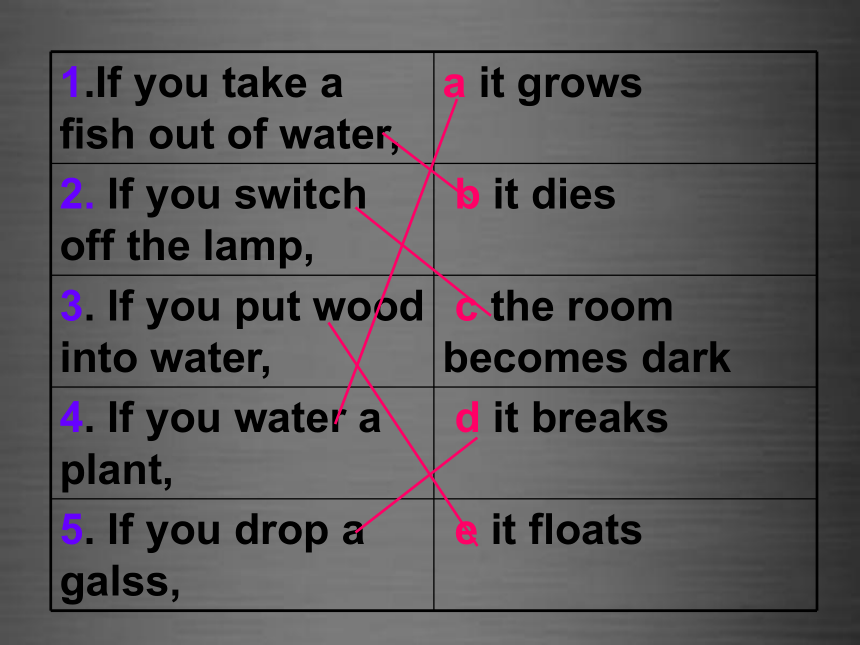

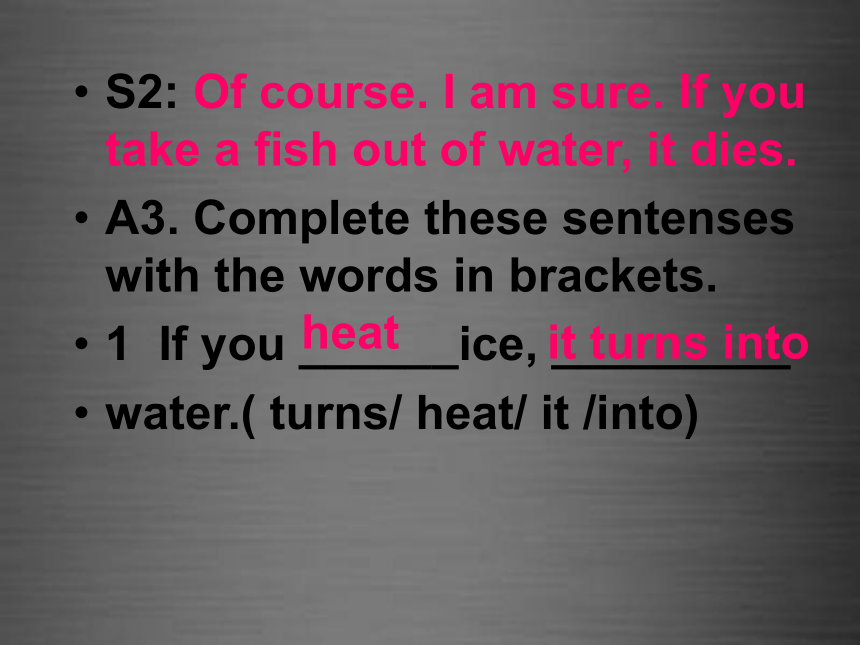
文档简介
课件21张PPT。 Unit 7 Memory GrammarA Conditional sentences
We have already learnt to use conditional sentences to talk about probable results
We can also use conditional sentences to talk about results that will certainly happen.The if-clause talks about a
possible action If you put salt into water,
it disappears.The main clause talks about
the result that will certainly
happenWork out the rule
When we use a conditional sentence to talk about something that will certainly happen, both verbs should be in the simple present tense/ the simple future tense.Things to remember
We can also put the if-clause after the main clause.
Salt disappears if you put it into water.
A1 Read these if –clauses and draw lines to match them with the results
A2 In pairs ,make conversations about the sentences in A1 on page 103. Following the example.
S1: What happens if you take a fish out of water?
S2: It dies.
S1: Are you sure?
S2: Of course. I am sure. If you take a fish out of water, it dies.
A3. Complete these sentenses with the words in brackets.
1 If you ______ice, _________
water.( turns/ heat/ it /into)heatit turns into 2. If you ____steam, it _________
water. (into/cool/turns/ it)
3. Oil ______________________
water .(on/floats/pour/if /you/if)
4. Water __________________it
(you/heat/boils/if)coolit turns intofloats if you pour it on boils if you heatB if…not and unless
The word unless can mean if …not. For example, the two sentences below have the same meaning:
If you do not get enough sleep every night, you will not remember things well.Unless you get enough sleep
every night, you will not
remember things well.Things to remember
We can also put the if –clause and the unless –clause after the main clause.
You will be late for school
if you do not leave now.
unless you leave now.B1 Draw lines to match the beginnings of the sentences in Column A with the endings in Column B.B2 Rewrite the following sentences with unless.
1 If you do not improve your handwriting, you will lose marks in the exam.
Unless you improve your handwriting , you will lose marks in the exam.You will lose marks in the exam unless you improve your handwriting.
2 You will get a toothache if you do not brush your teeth every day.
You will get a toothache unless you brush your teeth every day.
Unless you brush your teeth every day, you will get a toothache.
3. This room will get very hot if you do not open the window.
This room will get very hot unless you open the window.
Unless you open the window, this room will get very hot.4 If you do not close that window, flies will get in.
Unless you close that window, flies will get in.
Flies will get in, unless you close that window.
5. I will leave this restaurant if the waiter does not come soon.
I will leave this restaurant unless the waiter come soon.
Unless the waiter come soon, I will leave this reataurant. Thank you !课件21张PPT。 Unit 7 Memory GrammarA Conditional sentences
We have already learnt to use conditional sentences to talk about probable results
We can also use conditional sentences to talk about results that will certainly happen.The if-clause talks about a
possible action If you put salt into water,
it disappears.The main clause talks about
the result that will certainly
happenWork out the rule
When we use a conditional sentence to talk about something that will certainly happen, both verbs should be in the simple present tense/ the simple future tense.Things to remember
We can also put the if-clause after the main clause.
Salt disappears if you put it into water.
A1 Read these if –clauses and draw lines to match them with the results
A2 In pairs ,make conversations about the sentences in A1 on page 103. Following the example.
S1: What happens if you take a fish out of water?
S2: It dies.
S1: Are you sure?
S2: Of course. I am sure. If you take a fish out of water, it dies.
A3. Complete these sentenses with the words in brackets.
1 If you ______ice, _________
water.( turns/ heat/ it /into)heatit turns into 2. If you ____steam, it _________
water. (into/cool/turns/ it)
3. Oil ______________________
water .(on/floats/pour/if /you/if)
4. Water __________________it
(you/heat/boils/if)coolit turns intofloats if you pour it on boils if you heatB if…not and unless
The word unless can mean if …not. For example, the two sentences below have the same meaning:
If you do not get enough sleep every night, you will not remember things well.Unless you get enough sleep
every night, you will not
remember things well.Things to remember
We can also put the if –clause and the unless –clause after the main clause.
You will be late for school
if you do not leave now.
unless you leave now.B1 Draw lines to match the beginnings of the sentences in Column A with the endings in Column B.B2 Rewrite the following sentences with unless.
1 If you do not improve your handwriting, you will lose marks in the exam.
Unless you improve your handwriting , you will lose marks in the exam.You will lose marks in the exam unless you improve your handwriting.
2 You will get a toothache if you do not brush your teeth every day.
You will get a toothache unless you brush your teeth every day.
Unless you brush your teeth every day, you will get a toothache.
3. This room will get very hot if you do not open the window.
This room will get very hot unless you open the window.
Unless you open the window, this room will get very hot.4 If you do not close that window, flies will get in.
Unless you close that window, flies will get in.
Flies will get in, unless you close that window.
5. I will leave this restaurant if the waiter does not come soon.
I will leave this restaurant unless the waiter come soon.
Unless the waiter come soon, I will leave this reataurant. Thank you !
We have already learnt to use conditional sentences to talk about probable results
We can also use conditional sentences to talk about results that will certainly happen.The if-clause talks about a
possible action If you put salt into water,
it disappears.The main clause talks about
the result that will certainly
happenWork out the rule
When we use a conditional sentence to talk about something that will certainly happen, both verbs should be in the simple present tense/ the simple future tense.Things to remember
We can also put the if-clause after the main clause.
Salt disappears if you put it into water.
A1 Read these if –clauses and draw lines to match them with the results
A2 In pairs ,make conversations about the sentences in A1 on page 103. Following the example.
S1: What happens if you take a fish out of water?
S2: It dies.
S1: Are you sure?
S2: Of course. I am sure. If you take a fish out of water, it dies.
A3. Complete these sentenses with the words in brackets.
1 If you ______ice, _________
water.( turns/ heat/ it /into)heatit turns into 2. If you ____steam, it _________
water. (into/cool/turns/ it)
3. Oil ______________________
water .(on/floats/pour/if /you/if)
4. Water __________________it
(you/heat/boils/if)coolit turns intofloats if you pour it on boils if you heatB if…not and unless
The word unless can mean if …not. For example, the two sentences below have the same meaning:
If you do not get enough sleep every night, you will not remember things well.Unless you get enough sleep
every night, you will not
remember things well.Things to remember
We can also put the if –clause and the unless –clause after the main clause.
You will be late for school
if you do not leave now.
unless you leave now.B1 Draw lines to match the beginnings of the sentences in Column A with the endings in Column B.B2 Rewrite the following sentences with unless.
1 If you do not improve your handwriting, you will lose marks in the exam.
Unless you improve your handwriting , you will lose marks in the exam.You will lose marks in the exam unless you improve your handwriting.
2 You will get a toothache if you do not brush your teeth every day.
You will get a toothache unless you brush your teeth every day.
Unless you brush your teeth every day, you will get a toothache.
3. This room will get very hot if you do not open the window.
This room will get very hot unless you open the window.
Unless you open the window, this room will get very hot.4 If you do not close that window, flies will get in.
Unless you close that window, flies will get in.
Flies will get in, unless you close that window.
5. I will leave this restaurant if the waiter does not come soon.
I will leave this restaurant unless the waiter come soon.
Unless the waiter come soon, I will leave this reataurant. Thank you !课件21张PPT。 Unit 7 Memory GrammarA Conditional sentences
We have already learnt to use conditional sentences to talk about probable results
We can also use conditional sentences to talk about results that will certainly happen.The if-clause talks about a
possible action If you put salt into water,
it disappears.The main clause talks about
the result that will certainly
happenWork out the rule
When we use a conditional sentence to talk about something that will certainly happen, both verbs should be in the simple present tense/ the simple future tense.Things to remember
We can also put the if-clause after the main clause.
Salt disappears if you put it into water.
A1 Read these if –clauses and draw lines to match them with the results
A2 In pairs ,make conversations about the sentences in A1 on page 103. Following the example.
S1: What happens if you take a fish out of water?
S2: It dies.
S1: Are you sure?
S2: Of course. I am sure. If you take a fish out of water, it dies.
A3. Complete these sentenses with the words in brackets.
1 If you ______ice, _________
water.( turns/ heat/ it /into)heatit turns into 2. If you ____steam, it _________
water. (into/cool/turns/ it)
3. Oil ______________________
water .(on/floats/pour/if /you/if)
4. Water __________________it
(you/heat/boils/if)coolit turns intofloats if you pour it on boils if you heatB if…not and unless
The word unless can mean if …not. For example, the two sentences below have the same meaning:
If you do not get enough sleep every night, you will not remember things well.Unless you get enough sleep
every night, you will not
remember things well.Things to remember
We can also put the if –clause and the unless –clause after the main clause.
You will be late for school
if you do not leave now.
unless you leave now.B1 Draw lines to match the beginnings of the sentences in Column A with the endings in Column B.B2 Rewrite the following sentences with unless.
1 If you do not improve your handwriting, you will lose marks in the exam.
Unless you improve your handwriting , you will lose marks in the exam.You will lose marks in the exam unless you improve your handwriting.
2 You will get a toothache if you do not brush your teeth every day.
You will get a toothache unless you brush your teeth every day.
Unless you brush your teeth every day, you will get a toothache.
3. This room will get very hot if you do not open the window.
This room will get very hot unless you open the window.
Unless you open the window, this room will get very hot.4 If you do not close that window, flies will get in.
Unless you close that window, flies will get in.
Flies will get in, unless you close that window.
5. I will leave this restaurant if the waiter does not come soon.
I will leave this restaurant unless the waiter come soon.
Unless the waiter come soon, I will leave this reataurant. Thank you !
